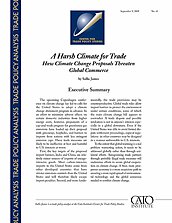First, the key targets of the proposed import barriers, India and China, are relatively minor sources of imports of energy-intensive goods. Most carbon-intensive imports to the United States come from other developed countries that have stricter emissions controls than the United States and will therefore likely escape import penalties. Second, and more fundamentally, the trade provisions may be counterproductive. Global trade rules allow import barriers to protect the environment under certain conditions, some of which the main climate change bill appears to contradict. A trade dispute and possible retaliation is not in anyone’s interest, especially in a global downturn. Even if the United States was able to avoid formal dispute settlement proceedings, copycat regulations in other countries may be designed in a manner unfavorable to U.S. interests.
To the extent that global warming is a real problem warranting action, it needs to be addressed globally rather than through unilateral efforts. Antagonizing trade partners through probably illegal trade measures will undermine efforts to secure global cooperation on climate change. A freer, more prosperous economy is a more auspicious path to ensuring a more rapid spread of environmental technology and the global consensus needed to combat climate change.


